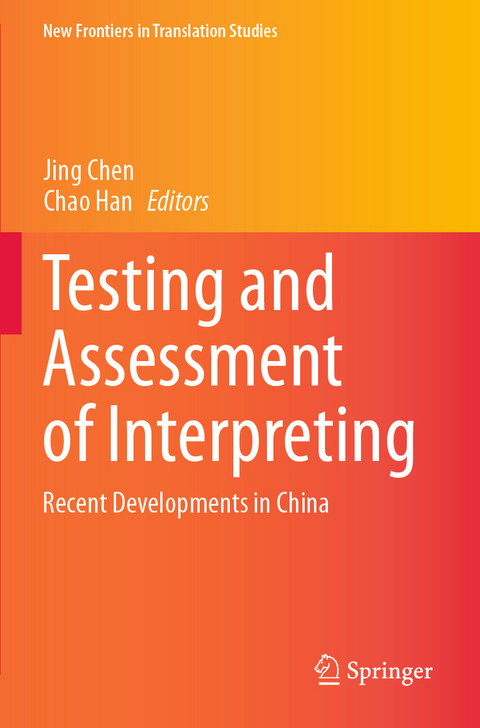
Testing and Assessment of Interpreting
Springer Verlag, Singapore
978-981-15-8556-2 (ISBN)
Professor Jing Chen is currently the Dean of the College of Foreign Languages and Cultures, Xiamen University, China. Her research interests include interpreting quality assessment and interpreting pedagogy. She has published widely in peer-reviewed journals in English and Chinese (e.g., Interpreter and Translator Trainer, Language Assessment Quarterly, Chinese Translators Journal), and she has led several large-scale research projects funded by the European Union (i.e., Asia Link - the EU-Asia Interpreting Studies) and the China National Social Sciences Foundation (NSSF). Currently, she is the Principle Investigator of a major national-level research project funded by NSSF (2018-2022). She is also serving as the Deputy Director of the National Interpreting Committee of the Translators Association of China. In 2011 she was honored by China’s Ministry of Education in the New Century Talent Program for her outstanding intellectual and academic achievements. Professor Chao Han is currently affiliated with the College of International Studies, Southwest University, China. He conducted his PhD research at the Department of Linguistics at Macquarie University (Sydney), focusing on interpreter certification performance testing. His research interests include testing and assessment of translation and interpreting (T&I), evidence-based T&I studies, and research methodology. His recent publications have appeared in such journals as Interpreting, Perspectives, Language Testing, Language Assessment Quarterly, and Assessment and Evaluation in Higher Education. Currently, he is the Principle Investigator in an NSSF-funded project to develop rubrics-referenced rating scales for interpreter certification performance testing. (ORCID ID: 0000-0002-6712-0555)
Chapter 1. Fundamental considerations in interpreting testing.- Chapter 2. Standardization of interpreting testing in China.- Chapter 3. Using generalizability theory to explore reliable measurement design for interpreting assessment.- Chapter 4. A Thurstonian comparative judgement approach to assess interpreting: A mixed-methods feasibility study.- Chapter 5. Predictive validity of retelling exercise in aptitude testing for interpreting.- Chapter 6. Examining how rubric training influences students’ assessment and awareness of interpreting.- Chapter 7. Propositional analysis in consecutive interpreting assessment.- Chapter 8. Validation of a summative interpreting test: A multifaceted Rasch measurement approach.- Chapter 9. Development and application of interpreting scale of China’s Standards of English.- Chapter 10. Automatic assessment of interpreting quality based on Coh-Metrix Model.- Chapter 11. Predicting judged fluency ofconsecutive interpreting from acoustic measures Potential for automatic assessment and pedagogic implications.- Chapter 12: Theorizing a machine-aided interpreting assessment system.
| Erscheinungsdatum | 19.04.2022 |
|---|---|
| Reihe/Serie | New Frontiers in Translation Studies |
| Zusatzinfo | 5 Illustrations, color; 15 Illustrations, black and white; VIII, 200 p. 20 illus., 5 illus. in color. |
| Verlagsort | Singapore |
| Sprache | englisch |
| Maße | 155 x 235 mm |
| Themenwelt | Geisteswissenschaften ► Sprach- / Literaturwissenschaft ► Sprachwissenschaft |
| Informatik ► Theorie / Studium ► Künstliche Intelligenz / Robotik | |
| Sozialwissenschaften ► Pädagogik ► Bildungstheorie | |
| Sozialwissenschaften ► Pädagogik ► Schulpädagogik / Grundschule | |
| Schlagworte | Interpreting • Interpreting Quality Assessment • Interpreting studies • Interpreting Testing and Assessment • Translation and interpreting • Translation Studies |
| ISBN-10 | 981-15-8556-3 / 9811585563 |
| ISBN-13 | 978-981-15-8556-2 / 9789811585562 |
| Zustand | Neuware |
| Haben Sie eine Frage zum Produkt? |
aus dem Bereich


